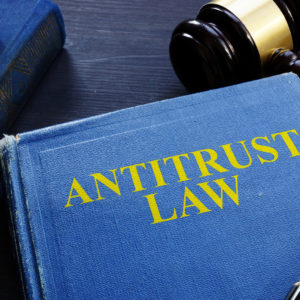Antitrust scrutiny of the tech industry could be the big issue that spurs bipartisan cooperation in Congress over the next two years.
While Democrats have long been suspicious of big business and always much quicker to cry “antitrust,” Republicans are now asking questions about the size of big tech companies and appear to be more open to antitrust action, claiming Silicon Valley harbors a left-leaning bias and censors conservatives.
Combine that with a Trump administration eager to stop big mergers on antitrust grounds and there’s a recipe for a bumpy two years filled with more hearings, more oversight and likely legislation.
“There’s been a lot of questions about whether the larger tech platforms are monopolies and have solidified dominance in the market place through mergers and acquisitions of smaller companies — like Facebook through its acquisitions of Instagram and WhatsApp — and the FTC at the time really didn’t think twice about those mergers, and I think since then there’s been some acknowledgment and renewed interest of large dominant firms acquiring smaller nascent but potentially future rival firms, and viewing that as anti-competitive in the future,” said Philip Berenboick, policy counsel at Public Knowledge.
Berenboick thinks Congress will likely hold more oversight seeings and summon agencies like the FTC and the FCC to the hill to testify.
“They can send a loud message to those agencies about what they want to see as far as policy and merger enforcement and what they want to see bared down on,” Berenboick told InsideSources.
Democrats may attack the FCC in particular, and not just over the net neutrality debate.
“The FCC did a lot of work last year around loosening up broadcast regulations, which a lot of people saw as a way to give a green light to the Sinclair-Tribune merger,” Berenboick said.
That merger fell apart, but Sinclair could still try to find another buyer, which Democrats are “really concerned about.”
“They saw Sinclair as a Maryland-based company that didn’t have ties to communities and was going to come in and gut local news coverage, which is especially important in times of national emergencies and disasters,” Berenboick said. “Regardless of that deal I think you’ll see some oversight from House Energy and Commerce Committee Democrats at what the FCC did and why they did it and how it affects local news.”
As opposed to years past, a Democratic antitrust crusade may now have an ally in the GOP.
For the first time in years, Democrats’ and Republicans’ views on antitrust “don’t seem too different,” said Mark Jamison, director of the Public Utility Research Center at the University of Florida’s Warrington College of Business and a visiting scholar at the American Enterprise Institute (AEI).
“There’s some space for agreement for how the Democrats view business in general and how the Republicans view these particular businesses,” Jamison told InsideSources. “I think legislation is more likely than it was a year ago, or even two years ago. Republicans’ view that the tech industry plays favorites has grown, and there’s more agreement than there used to be.”
Because antitrust scrutiny and litigation is rooted in protecting consumers, Jamison thinks Democrats and Republicans will probably come up with legislation that focuses on protecting consumers served by the tech industry.
One easy way to do that is to draft a privacy law, which is already a top priority for House Democrats and Republicans.
“Customers feel violated when people know things about them and it’s very tempting for politicians to come to the rescue,” Jamison said. “As long as they focus on customer benefit, we should be ok. If they start moving down the path of, ‘We’re just worried about them because they’re big or there are other social ills we want to cure using antitrust litigation,’ then they start doing harm as opposed to good.”

